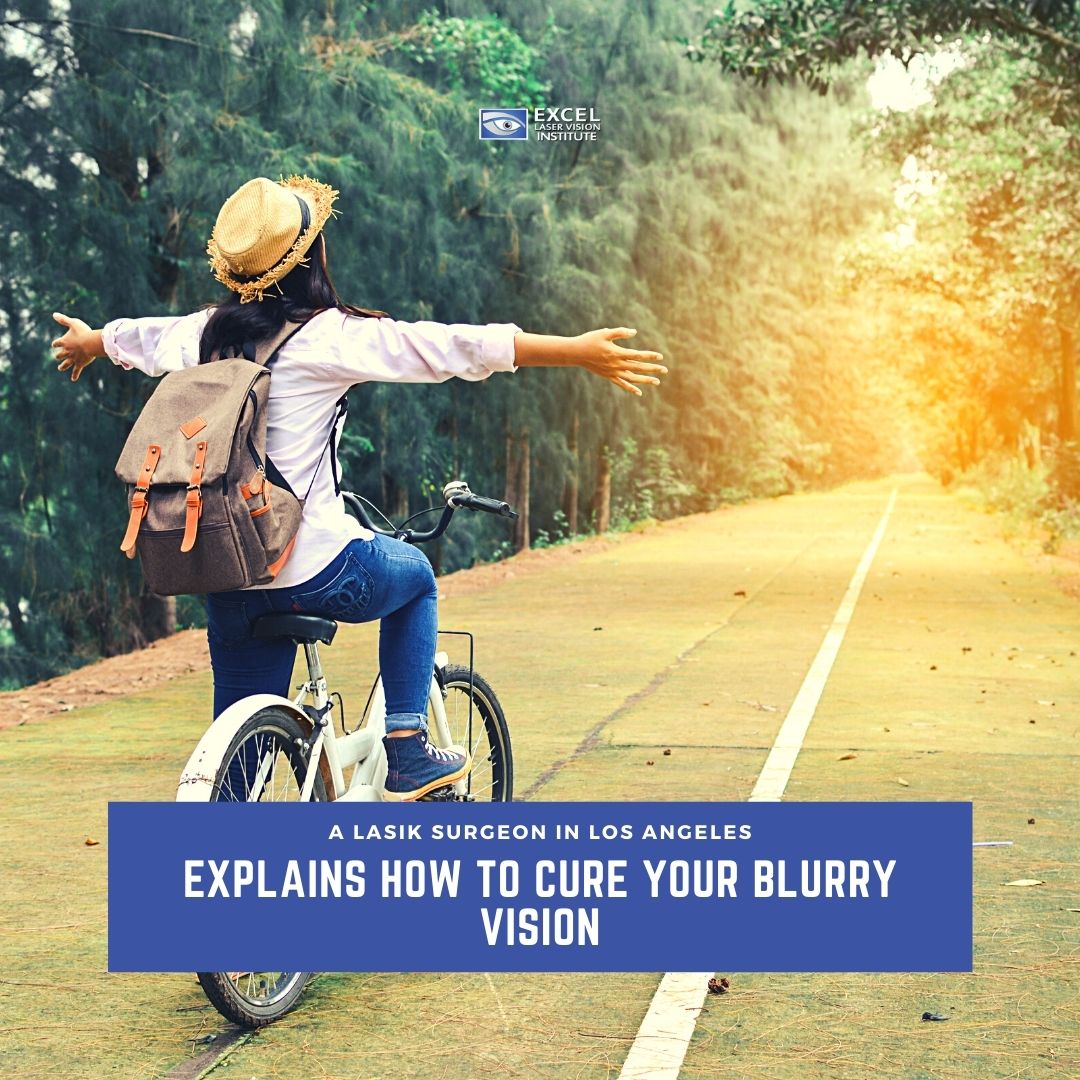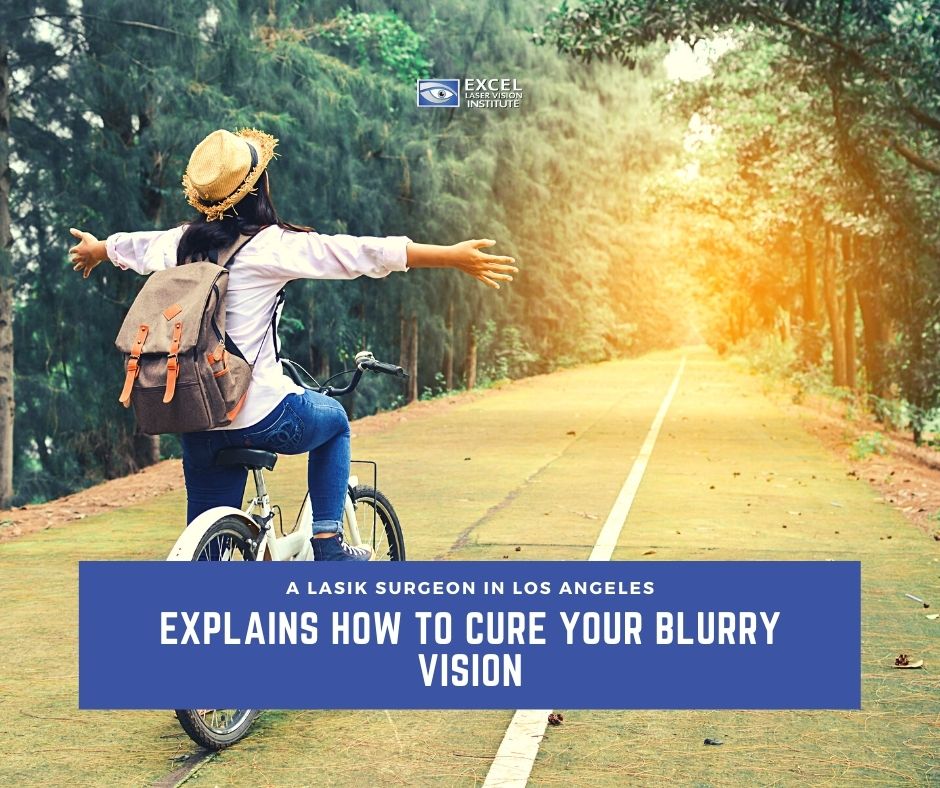
The LASIK surgeons in Los Angeles explain the blurry vision to us as a loss of sharpness of eyesight that makes objects look out of focus and hazy.
The main causes of blurred vision are refractive errors such as nearsightedness, farsightedness, and astigmatism or presbyopia. However, there have been patients who come for laser eye surgery complaining about a blurry vision that could be one of the first symptoms of something more serious, such as potentially sight-threatening eye disease or neurological disorder.
Plus, blurred vision can affect both eyes, however, some individuals experience blurry vision in one eye only.

LASIK eye center doctors explain cloudy vision – when you see objects as obscured and appear “milky,” is equivalent to blurry vision. Normally, cloudy vision is a symptom of particular conditions such as cataracts. Both blurry vision and cloudy vision are symptoms of a serious eye problem, especially if they happen suddenly.
LASIK experts in Los Angeles recommend that the best way to find out if you have blurry vision and what is causing it is to visit an eye doctor for a comprehensive eye exam.
Blurry Vision: What Are The Causes And Treatments?
Myopia: Myopia, or nearsightedness, has various symptoms which include squinting, eye strain, headaches, and blurry vision in one or both eyes. Myopia is the most common refractive error and leads to a person seeing distant objects in a blurred manner.
Eyeglasses, contact lenses, and refractive surgery such as LASIK and PRK are the most common ways to correct nearsightedness.
Hyperopia: Hyperopia, or farsightedness, allows people to see distant objects clearly but their eyes can’t focus properly on close-up objects. If they try to, it causes unusual eye strain and fatigue. Also, when an individual suffers from severe farsightedness, even distant objects may appear blurred.
Similar to myopia, hyperopia can be corrected with eyeglasses, contact lenses, or refractive eye surgery.
Astigmatism: This is when a person experiences blurred vision at all distances. It is a type of refractive error, and it is usually caused by an irregularly shaped cornea.
With astigmatism, light rays fail to come to a single focus point on the retina to create a clear vision, no matter how far away the viewed object is from your eyes.
Astigmatism, similar to nearsightedness and farsightedness, can be corrected with eyeglasses, contact lenses, or refractive surgery.
Presbyopia: If you’re over the age of 40 and are beginning to notice blurry vision up close especially when reading a text message, a restaurant menu, food label, or other small print, for instance — most likely this is because there is the onset of presbyopia, a normal age-related vision problem.
While the symptoms of presbyopia are very similar to those that cause hyperopia (blurry near vision; eye strain when reading), presbyopia is an age-related loss of ability to focus on near objects because of the hardening of the lens inside the eye.
Normally, your optometrist will provide you with the most common treatments for presbyopia which include progressive lenses, bifocals, and reading glasses. If that isn’t suitable for you, there are also presbyopia surgery options such as corneal inlays, monovision LASIK, and conductive keratoplasty.
When you select eyeglasses to correct refractive errors and presbyopia, clarity and comfort can be improved with an anti-reflective coating and photochromic lenses. Make sure to ask your optician for more details.
Chronic dry eyes: Dry eye syndrome can affect your eyes in various ways, including causing variable blurry vision. Although artificial tears (lubricating eye drops) can help, more advanced cases of dry eye may need a prescription medication or punctal plugs to keep your eyes comfortable, healthy, and seeing properly.
Pregnancy: Blurry vision is not uncommon during pregnancy and sometimes pregnant women also experience double vision (diplopia). Hormonal changes can change the shape and thickness of your cornea, causing your vision to blur. Dry eyes also are normal to see in pregnant women and can cause blurred vision.
If you have any vision disturbances during your pregnancy, you should always let your doctor know. Although blurry vision is no always serious, in some instances it could be a sign of gestational diabetes or high blood pressure.
Ocular migraines or migraine headaches: Even though for the most part blurred vision, flickering light, halos, or zigzag patterns are harmless and temporary, they are all common symptoms before the beginning of an ocular migraine or migraine headache.
Eye floaters: Vision can be blurred by temporary spots or floaters that aimlessly move in your field of vision. Floaters usually appear when the eye’s gel-like vitreous starts to liquefy with age, resulting in microscopic bits of tissue within the vitreous to drift around freely inside the eye, casting shadows on the retina.
If you see an abrupt onset of floaters, this could be a sign of a torn or detached retina and you should see an eye doctor immediately.
Blurry vision after LASIK: Your vision may be blurry or hazy right after LASIK or any other type of refractive surgery. The clarity of your eyesight normally improves within a few days, but it may take more time for your vision to stabilize completely.
Eye drops and medication: Particularly eye drops — especially eye drops that contain preservatives — can cause irritation and blurry vision.
Additionally, some medications such as allergy pills can cause side effects of dry eyes and blurred vision. During a comprehensive eye exam, your eye doctor can advise you whether any of your medications may be the culprit to your blurry vision.
Over-wearing contact lenses: Wearing disposable contact lenses (or any type of contacts) for longer than your doctor recommends will cause proteins and other debris in your tear film to accumulate on the lenses. This can cause blurry vision and increase your risk of eye infections.
When you experience blurry vision that lasts for a long time or is very frequent, it is always advisable that you speak to a LASIK expert in Los Angeles like Doctor Moosa of Excel Laser Vision Institute immediately to rule out any serious vision problems.




